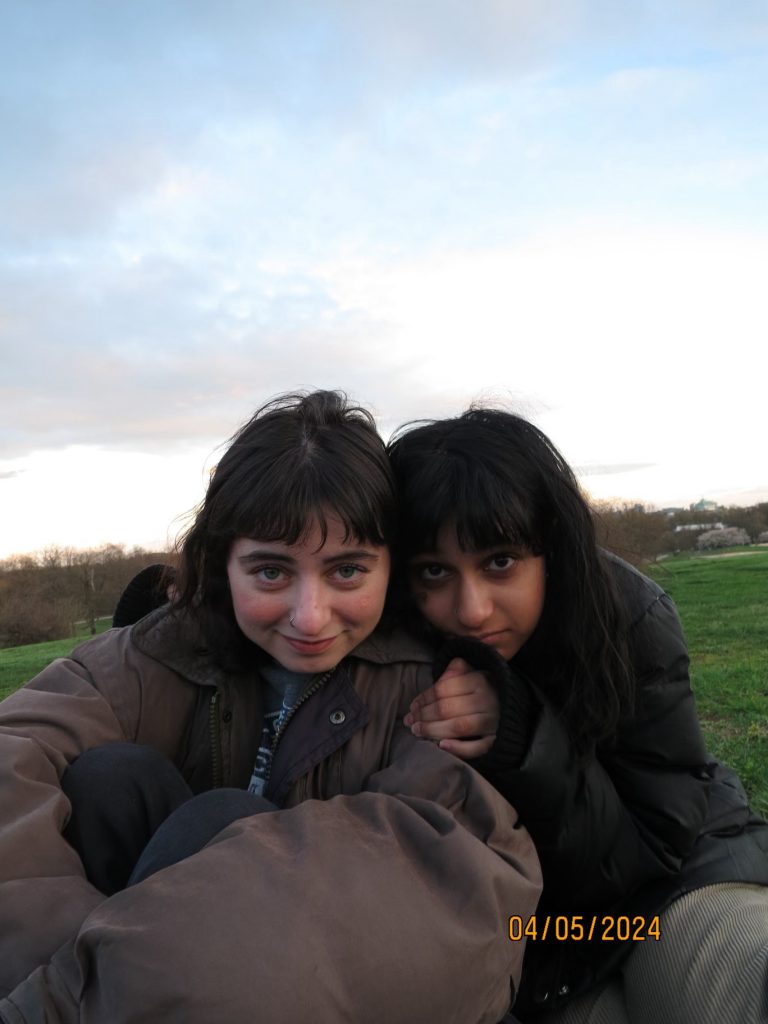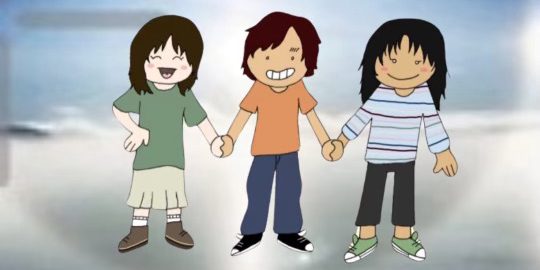UCLA Radio’s Rising Artist Spotlight aims to highlight upcoming artists who have demonstrated unique creativity and talent through their music. Through interviews and features, we delve into their journey, influences, and aspirations, giving listeners a glimpse into the future of music.
Rising Artist Spotlight notoriously highlights musicians who we believe are the next generation of music. In this instance, we want to recognize other artists that are pioneering their genre. The Internet Is Dead Podcast brings light into the depths of the web, highlighting phenomenons such as stan culture and taking internet personalities on their show. UCLA Radio sat down with the duo to discuss everything about their podcast, including their origin story and talking to guests.
This interview has been edited for clarity and brevity purposes
Interviewed by Chloe Gonzales
Chloe: What is your podcast about?
Sameera: It’s about internet culture!
Brittany: I think what makes it different from other podcasts is the fact that it’s made by fans of internet personalities who understand what we want to hear from the internet people we used to watch growing up.
Sameera: Especially growing up watching Youtubers – thinking that they were so cool and had everything – and being jealous of them. It’s cool to interview them and see another side of them.
Brittany: They seem otherworldly, but then you speak to them, and they’re just people. I feel like that’s been a thing growing up on the internet, and you have to unwork that.
Chloe: And what type of Youtubers and other people do you interact with? What type of internet girls were you? Did you watch Minecraft Youtubers, for example?
Brittany: Yes, I watched The Cube [Minecraft Youtuber]! I feel like Sims Youtubers got me into YouTube. But in general, I had a Ariana Grande fan account, a Tana Mongeau fan account, a lolAnthony fan account, and a Fifth Harmony fan account. That was my little realm.
Sameera: I was really into boy bands like One Direction, Five Seconds of Summer, Sleeping with Sirens, All Time Low, and more. Then my interests just stemmed from there. I was also very much into the old British Youtubers, and I went through a beauty guru phase.
Chloe: Any dream guests for your podcast?
Brittany: Drew and Enya, they are so impactful to internet culture, as well as Emma Chamberlain — her growth is so fascinating, Claudia Sulewski as well. I know we are not nearly as big to have huge pop stars, but having Ariana Grande for example, just because having people who we had fan accounts of— I want to talk to them about that because I’m so interested in what that feels like – to be someone who has a bunch of fan accounts.
Sameera: If we had people who had beef online and brought them together, that would be cool. Like Sabrina Carpenter and Olivia Rodrigo, or Taylor Swift and Kim Kardashian.
Brittany: I would really like to talk to Tana Mongeau because I was really entrenched in her fandom. I think it would be really interesting to see an interaction between someone who idolized a person and the person. H3 is also really interesting because they almost spearheaded internet news.
Sameera: Even like Charli xcx right now with everything she’s doing, and her brand is so fascinating.
Chloe: And it seems like you guys touch on psychology and different phenomenons like stan culture…
Brittany: It’s so interesting, because the internet shapes kids nowadays. I think it shaped us when we were young, but I don’t think everyone was on that. Now it feels like everyone is a part of that, in some way.
Sameera: It’s crazy how much it affects people.
Chloe: I don’t know if it’s a good thing or not. It’s like a neutral good.
Brittany: I was thinking about that too! For me, I think I got on it after I developed and was smart enough to use it in a way that wasn’t stupid. It’s scary when you’re growing up on it and you have so much access.

Sameera: It definitely has the potential to be a good thing, but your brain is in such a weird place when you’re in middle school. We talked about this a lot, where we were so depressed when we were 13 or 14. And then it’s crazy being depressed on the internet, because it can be really good or really bad. I remember being on Tumblr, where it romanticized mental illnesses and eating disorders. And I think that one good thing is the internet has come a long way from there, where that doesn’t happen as much. But I also think that it does, just in a different way. I think Tiktok is Tumblr reinvented, it’s brought out a lot of the things Tumblr used to do. So it’s definitely interesting.
It’s comforting to log on online and know that you aren’t alone, and that there are other people out there that also feel the way you do. But I also think that it glorifies sitting in your room,going online, and being depressed –not socializing or interacting with anyone. And I think that’s a scary thing to find a balance with. If you become a parent, it will be really hard to navigate that: teaching your kid about social media and coming up with boundaries.
—
Chloe: I also wanted to know, how do you guys prepare for your interviews? Because a lot of the episodes I’ve listened to seem really conversational, and don’t have this question-answer structure.
Sameera: Our goal going into the podcast was to make it very genuine, and to feel like a conversation. I think those are the best ones! It’s definitely something that we’ve gotten more comfortable with. We’ll come up with an outline of the main questions that we definitely want to ask. We go into it with a few ideas in our heads and just let the conversation flow from there.
Brittany: Also to prep, we will find everything online about the person. I feel like just knowing things about people and actually just being interested in them makes it really easy for us to have so many things that we’re curious about. So it really comes up naturally, and it’s these people we look up to. We try to think of “What would I do if I walked up to someone who seemed cool?” in public and talked to them. I feel like thinking about it that way helps, because we can just talk about real things too.
Chloe: It also goes back to idolizing versus making them human because they’re just people like us at the end of the day.
Brittany: It’s hard because that nervousness is there, just like when you talk to a peer. I try to remind myself about that, because obviously there’s a different element of stress when you’re recording something and you know other people are listening to it. So it adds this thing where we stop recording and it feels like a little weight is lifted, and we are talking normally with the person. But when recording, it’s like a third thing is watching you and you almost have to unwork it in your head. I feel like that’s what we had to do starting out, because we would be nervous about the idea of people listening to it.
Sameera: You have to forget that you’re being perceived, almost. That was a big thing, and I still have this thing where I’m worried about people misinterpreting what I’m saying, or thinking that I’m coming off sounding really dumb. And I also think that’s such a big thing for girls in general, because I feel like guys don’t have that as much, and talk really confidently. I’m trying to get better at that: being more confident in what I’m saying. Because no matter what you say, someone’s gonna take it and misinterpret it. I think it’s just about speaking with confidence, even if what you’re saying is bullshit.
Chloe: I never thought about the third-person perspective, especially because you’re all on video too! With that, I would even think about my facial expression and such, just overanalyzing everything.
Brittany: It’s hard. I also feel like when I would listen to podcasts, I would be like, “how on earth are they doing this and sounding so smart?” And then it’s weird because if you do an okay job at talking to someone, when you go back and rewatch it, you sound really smart. I’ve noticed that when I’m editing, which is weird because we will perceive something as being awkward in the moment, and then I go back and edit it and it’s not awkward at all. It’s weird how that shifts your perspective, when you’re recording something. I also think that people watching themselves from the outside does something crazy to them psychologically. Because even when I’m editing something, psychologically I think something is way easier because I’m not in the moment having to talk to someone. I’m watching it and it feels just like I’m listening to other podcasts.
—
Chloe: I also wanted to know when you guys were creating your podcast, how long did you sit on the idea until it came to fruition?
Brittany: We made a joke when we became friends and tweeted two years ago, “thinking about starting a podcast called ‘Josh Ovalle, Please Be A Guest On My Podcast!’” And it was a joke, but we both had wanted to do it since we became friends. But we didn’t think that we were ready. We tried to record one time before and it flopped so hard.
Sameera: A year later, we tried to record an intro. Then another year an actual episode, but we didn’t like it.
—
Chloe: My last question for you is if you had a dj name, what would it be?
Brittany: What if we started this project and became DJs and called it Billie Ellish? And then we called it Billie for short.
Chloe: Ok !! So DJ Billie.
Check out the podcast below, available on platforms such as YouTube and Spotify!



